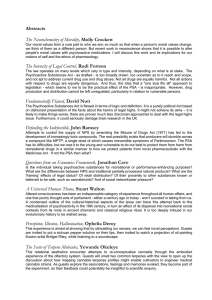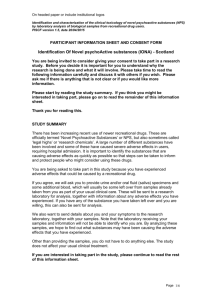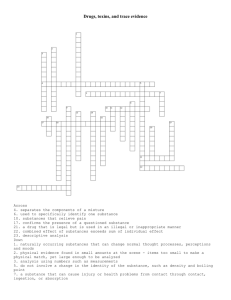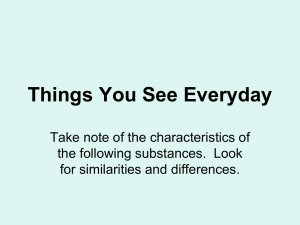On headed paper or include institutional logos
advertisement
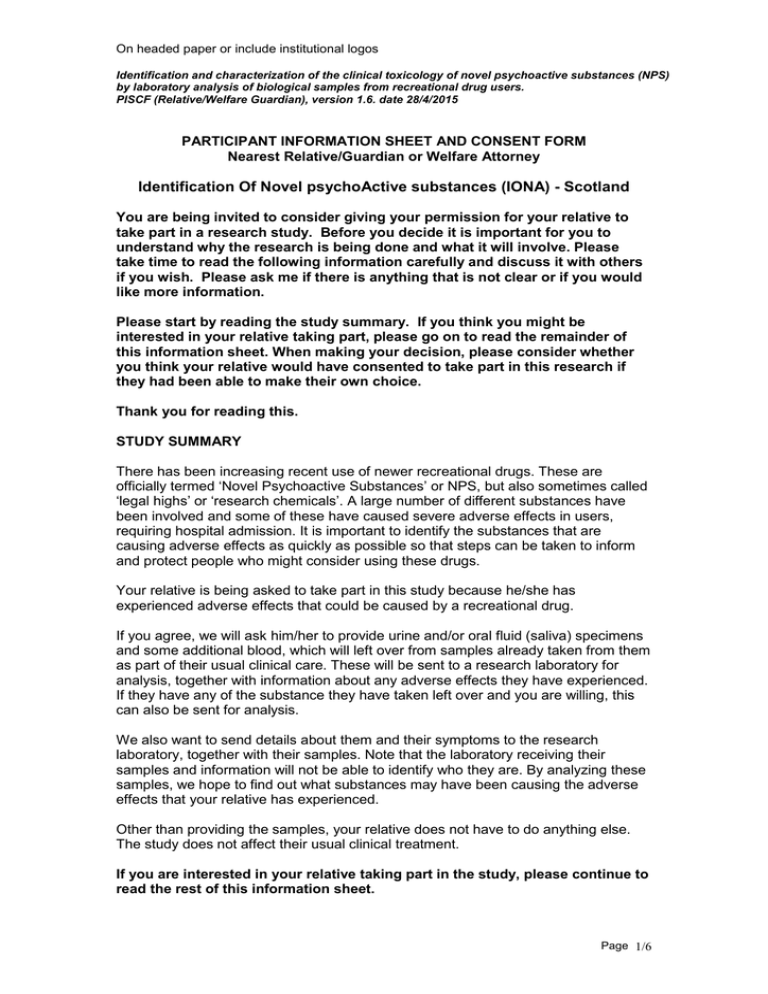
On headed paper or include institutional logos Identification and characterization of the clinical toxicology of novel psychoactive substances (NPS) by laboratory analysis of biological samples from recreational drug users. PISCF (Relative/Welfare Guardian), version 1.6. date 28/4/2015 PARTICIPANT INFORMATION SHEET AND CONSENT FORM Nearest Relative/Guardian or Welfare Attorney Identification Of Novel psychoActive substances (IONA) - Scotland You are being invited to consider giving your permission for your relative to take part in a research study. Before you decide it is important for you to understand why the research is being done and what it will involve. Please take time to read the following information carefully and discuss it with others if you wish. Please ask me if there is anything that is not clear or if you would like more information. Please start by reading the study summary. If you think you might be interested in your relative taking part, please go on to read the remainder of this information sheet. When making your decision, please consider whether you think your relative would have consented to take part in this research if they had been able to make their own choice. Thank you for reading this. STUDY SUMMARY There has been increasing recent use of newer recreational drugs. These are officially termed ‘Novel Psychoactive Substances’ or NPS, but also sometimes called ‘legal highs’ or ‘research chemicals’. A large number of different substances have been involved and some of these have caused severe adverse effects in users, requiring hospital admission. It is important to identify the substances that are causing adverse effects as quickly as possible so that steps can be taken to inform and protect people who might consider using these drugs. Your relative is being asked to take part in this study because he/she has experienced adverse effects that could be caused by a recreational drug. If you agree, we will ask him/her to provide urine and/or oral fluid (saliva) specimens and some additional blood, which will left over from samples already taken from them as part of their usual clinical care. These will be sent to a research laboratory for analysis, together with information about any adverse effects they have experienced. If they have any of the substance they have taken left over and you are willing, this can also be sent for analysis. We also want to send details about them and their symptoms to the research laboratory, together with their samples. Note that the laboratory receiving their samples and information will not be able to identify who they are. By analyzing these samples, we hope to find out what substances may have been causing the adverse effects that your relative has experienced. Other than providing the samples, your relative does not have to do anything else. The study does not affect their usual clinical treatment. If you are interested in your relative taking part in the study, please continue to read the rest of this information sheet. Page 1/6 On headed paper or include institutional logos Identification and characterization of the clinical toxicology of novel psychoactive substances (NPS) by laboratory analysis of biological samples from recreational drug users. PISCF (Relative/Welfare Guardian), version 1.6. date 28/4/2015 What is the purpose of the study? In recent years there has been increasing use of a group of new recreational drugs called ‘Novel Psychoactive Substances’ or NPS, sometimes also called ‘legal highs’ or ‘research chemicals.’ A large number of these substances have been sold to users via the internet, ‘head shops’ and by dealers. As these substances are new, there is usually no information about safety of use in humans. Some people who have taken these drugs have experienced severe adverse effects requiring hospital treatment and some people have died, although this is probably very uncommon. It is important to find out the substances involved when people develop severe adverse effects after recreational drug use. This means that actions can be considered to protect people who might consider using substances associated with danger. Such steps might include warnings to users or legal control (‘banning’ the specific substance). In this study we want to collect blood, urine and or saliva samples, together with clinical details, from people experiencing adverse effects after use of recreational drugs so that we can identify the chemicals that may be responsible and study the adverse effects that they may cause. Why has the patient been chosen? Your relative has come to hospital with symptoms that may have developed as a result of the use of a recreational drug, such as a ‘legal high’. We want to find out precisely which drugs may have caused their symptoms by analyzing their blood, urine and/or oral fluid (saliva) to see what drugs may be present. However, they currently lack the capacity to make an informed decision about whether they can take place in a research study. We are therefore asking you as their nearest relative, welfare attorney or guardian if you will give consent on their behalf to join this study. This is permissible under the Adults with Incapacity (Scotland) Act 2000. Do they have to take part? No. It is up to you to decide whether they take part in the research or not. If you do consent for them to participate, we will explain to you what is involved and give you this information sheet to keep. You will be asked to sign a consent form; before you do that, you can be given time to think this over and talk to your family and friends about it if you wish. If you decide to let your relative take part, you are still free to withdraw them from the study at any time, and you do not have to give a reason. This will not influence the treatment or standard of care that they receive, either now or in the future. Are there any criteria they need to meet before they can take part in the study? We want to include people in this research if they have taken a recreational drug and have experienced adverse effects. If you feel this does not apply to your relative, please tell us. Page 2/6 On headed paper or include institutional logos Identification and characterization of the clinical toxicology of novel psychoactive substances (NPS) by laboratory analysis of biological samples from recreational drug users. PISCF (Relative/Welfare Guardian), version 1.6. date 28/4/2015 Are there any reasons they couldn’t take part? It is not possible for people to take part if they are less than 16 years old, have not used a recreational drug or ‘legal high’ recently or have not experienced any adverse effects. If any of these apply to your relative, please tell us. What will happen to your relative if they take part in the research? If you agree to allow your relative to be included in the study, the researcher will use part of blood samples that are being taken as part of their routine clinical care. They will also ask them to provide urine and saliva specimens. They can also provide a sample of the substance they have taken (e.g. a tablet, powder, blotter etc) if you are willing and this is available. Most patients will provide only one blood saliva or urine sample, but further samples may be used, especially if the symptoms are continuing. What does my relative have to do? Other than providing the blood, saliva and urine specimens, they do not have to do anything. They can leave hospital as usual when they are well enough. What are the possible benefits of taking part? Your relative may not get a direct benefit from taking part in this study. It is possible that the research will identify the chemical name(s) of any drug(s) or legal high(s) that are in your relative’s blood, saliva or urine. This may help the doctors to treat him/her or advise on how long their symptoms may last. However, we cannot guarantee that the research will identify any drugs in their blood, saliva or urine, or that the results will be available while your relative is still in hospital. What are the possible disadvantages and risks of taking part? Risks of participation are very small as this simply involves collection of blood, urine and /or saliva on one or more occasions, while your relative is still in hospital. Blood samples will be taken at times when blood is already being taken as part of usual clinical care. Data collected will be treated in confidence and nothing that can identify your relative will be included in the information used for the research. What will happen if I don’t want my relative to carry on with the study? If you decide that you don’t want your relative to provide further samples, tell the researcher, who will comply with your wishes. If you decide you no longer want your relative’s samples to be used for the research, you can also tell the researcher. He/she can arrange for samples taken so far to be discarded, provided they have not already been analysed. If they have already been analysed, the results of that will not be discarded, but all links between your relative’s identity and the results will be destroyed, so that no one will be able to tell that the results come from them. What if there is a problem? If you have a concern about any aspect of this study, please contact <<INSERT LOCAL CONTACT DETAILS HERE>> who will do their best to answer your questions. In the unlikely event that something goes wrong and your relative is harmed during the research and this is due to someone‘s negligence then you may have grounds for a legal action for compensation against [NHS Organisation] but you may have to pay your legal costs. The normal National Health Service complaints mechanisms will still be available to you (if appropriate). Page 3/6 On headed paper or include institutional logos Identification and characterization of the clinical toxicology of novel psychoactive substances (NPS) by laboratory analysis of biological samples from recreational drug users. PISCF (Relative/Welfare Guardian), version 1.6. date 28/4/2015 What happens when the study is finished? All samples (blood, saliva, urine) will be destroyed once analysis is complete and in all cases within 1 year of the end of the research. The data collected during the study will be kept indefinitely but all the links between your relative’s data and their personal identity will be destroyed within one year of the end of the study. Will taking part in the study be kept confidential? If your relative takes part in this study, research staff will collect personal data about them and this will be regarded as strictly confidential. All study files will be kept securely locked away on the study site and will only be accessed by the research personnel involved in the study. Non-personal data will be entered onto a secure database. Access to this database will be password-protected and available to doctors and research staff, for the purpose of the study. All data stored on the computer will be coded and your relative’s name will not be used. They will be given a unique study number which will be shown on all data and test results. Your relative’s medical records may be looked at by representatives of regulatory authorities and by authorized people from the Hospital to monitor the study and ensure that it is being carried out correctly. Everyone who sees data has a duty to ensure that nothing occurs that could reveal their identity outside the research site. Results of any analysis will not be provided to the police. All the information about your relative’s participation in this study will be kept confidential, and all data will be stored for at least 10 years and then disposed of securely. Involvement of the General Practitioner We will not routinely notify your relative’s GP that they have taken part in the study, but their participation will be noted in their hospital/medical records. We ask your permission to inform the clinical team looking after your relative in hospital if we find anything that may have consequences for their health. This information will be passed on to you. It may also be provided to their GP if considered clinically necessary. What will happen with any samples? The blood and urine samples from your relative will be sent to the Research Laboratory at Newcastle University or the Scottish Police Authority Forensic Science (Edinburgh) laboratory for analysis, together with the clinical information about them. Any important findings will be returned to their usual clinician, as with any other clinical specimen. All samples will only be labelled with their unique study code rather than their personal details. This means that the research teams in Newcastle and the Scottish Police Authority Forensic Science laboratory will not be able to identify who they are. What will happen to the results of the research study? We will publish the results of the study in scientific journals. We will also present the findings at international meetings and to patient groups which have been involved in the design of this study and taken part in it. None of this material will include details that might identify people who took part in the research. Page 4/6 On headed paper or include institutional logos Identification and characterization of the clinical toxicology of novel psychoactive substances (NPS) by laboratory analysis of biological samples from recreational drug users. PISCF (Relative/Welfare Guardian), version 1.6. date 28/4/2015 Who is organising the research and why? The research is being organised by the Newcastle University Health Protection Research Unit and is supported by a grant from the National Institute for Health Research. The Newcastle Hospitals NHS Foundation Trust, as research sponsor, is responsible for ensuring it is conducted properly. Who has reviewed the study? All research in the NHS is looked at by an independent group of people, called a Research Ethics Committee. A favourable ethical opinion has been obtained from Scotland A Research Ethics Committee. NHS management approval has also been obtained. The conduct of the study at participating NHS Trusts, in terms of your relative’s treatment, has indemnity cover through the normal NHS schemes. The NHS is trying to improve clinical and research standards. This is being achieved through ‘clinical governance’. As part of this process, this study may be reviewed by a clinical governance team. Such a team would need to look at any information that was provide from your relative, to make sure that the research was carried out in accordance with proper procedures. If you have any further questions about the study please contact <<INSERT LOCAL CONTACT DETAILS HERE>> If you would like to discuss this study with someone independent of the study please contact: <<INSERT LOCAL CONTACT DETAILS HERE>> If you wish to make a complaint about the study please contact: <<INSERT LOCAL CONTACT DETAILS HERE>> Thank you for taking the time to read this information sheet Page 5/6 On headed paper or include institutional logos Identification and characterization of the clinical toxicology of novel psychoactive substances (NPS) by laboratory analysis of biological samples from recreational drug users. PISCF (Relative/Welfare Guardian), version 1.6. date 28/4/2015 Nearest Relative/Guardian or Welfare Attorney Consent Form Identification Of Novel psychoActive substances (IONA) – Scotland Participant ID: [Contact details of person taking consent] Please initial box 1. I confirm that I have read and understand the information sheet (Version 1.6, 28/4/2015) for the above study and have had the opportunity to consider the information and ask questions. 2. I understand that my relative’s participation is voluntary and that I am free to withdraw my relative from the study at any time, without giving any reason and without my relative’s medical care or legal rights being affected. 3. I understand that relevant sections of my relative’s medical notes and data collected during the study may be looked at by individuals from the Newcastle Hospitals NHS Foundation Trust, the National Institute for Health Research or from the NHS hospital performing the research, where it is relevant to my relative taking part in this research. I give permission for these individuals to have access to my relative’s records. 4. I agree to my relative taking part in the above study I confirm that I am the nearest relative for _________________________________ and that no other nearest relative or welfare attorney or guardian exists. Relationship to patient ________________________ I confirm that I am the Welfare Attorney or Guardian for _____________________________ _____________________ _____________ Name of person giving consent Date _________________________ Signature _________________________ ____________ _____________________________ Name of person taking consent Date Signature (if different from Researcher) 1x original – into Site File; 1x copy – to Participant; 1x copy – into medical notes Page 6/6
